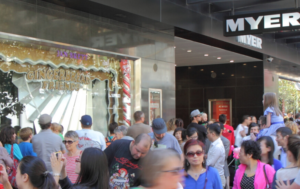Australians are doing Christmas a little differently this year. We spoke to 3,224 Australians about their gift giving in 2019 and found people’s views are slowly shifting. There’s an emerging trend to move away from cheerfully consuming piles of tomorrow’s landfill. But for most Aussies, ethical and environmental considerations won’t be front of mind when buying presents for their loved ones.

We’re cutting back
1 in 3 of us intend to buy fewer gifts this year. This is not a result of our increasing concern for the state of the planet and the impact of over consumption. Instead, it’s a sign of a constrained economy and uncertain predictions for the future according to Kantar’s Millenium Monitor. Less gift buying isn’t great news for retailers, but the side-effects for the environment are healthy.
Younger women are taking the lead
Perhaps unsurprisingly, women are three times more likely to buy gifts at Christmas than men. And when it comes to being a conscious consumer, younger female shoppers (women under 40) lead the way: They are twice as likely to buy ethical gifts than people over 40.
Ladies again take the lead on gifts that support a particular cause. Twice as many claim to want to receive this type of ‘gift that gives back’ than men. They’re also more inclined to give experience-based gifts over physical gifts, with 1 in 3 stating they prefer to do so.
We’re shopping more ethically but failing the environment
While still considered a niche market, ethical products are seeping into the mainstream. This year, 13% of Australians are looking to buy gifts that are made ethically. The Rana Plaza disaster might have faded from memory, however in 2019 The Modern Slavery Act has taken effect and grabbed the attention of at least some segments of the public. We’re beginning to ask more questions about the conditions experienced by the people that make our goods.
Climate change fills our newspapers and is working its way into our daily lives – plastic bag bans, smoke-filled Sydney skies and electric cars. Yet this Christmas, only 16% of us prefer to give gifts that are good for the environment. This begs the question – why aren’t more people wanting to do this?
The biggest barriers are assumedly cost and convenience, yet could this be misplaced? Being a ‘conscious consumer’ isn’t as simple as swapping out existing products for more eco-friendly alternatives. It first asks the question of whether the product is really needed. This train of thought leads to less ‘stuff’ being bought, saving money which can be effectively spent on more sustainable products of higher quality which last longer.
There’s an increasing number of places where discerning shoppers can find ethical gifts too. The Good Xmas Trail contains some of the best gift ideas from across Australia and every gift has the benefit of positively impacting people and/ or planet.
The war on Christmas waste
Australians’ concern about waste appears to be growing – we now know that throwing rubbish ‘away’ isn’t the solution. Instead, cutting back on waste is essential. This Christmas over a quarter of us are looking at how we can cut down on waste. So what of the three quarters of us who aren’t planning to cut back on waste this Christmas? It looks like we’ll still be decking out BBQ tables with plastic plates and finding joy in mountains of single-use wrapping paper.
Younger Aussies feel the impact of waste more strongly than their older counterparts: People under 40 are almost 3 times more likely to receive presents that make them feel wasteful than people over 40.
Further, if you’re considering giving a pre-loved gift this year, you’re in the small minority. Only 4% of Australians prefer to give pre-loved gifts. However for men under 40 this number jumps to almost almost 10% – what they’re gifting however is…a real mystery.
It’s mostly business as usual under the tree
This Christmas will see small changes in what we give as gifts. Especially for women and those under 40. But for the majority of us, it’s tinseltown Christmas as usual, with maybe just a couple less presents under the tree.
AUTHORS:
Penny Stephens – Marketing and Communications Manager, Goodsmiths. A background in marketing and communications across sectors, geographies and industries has led Penny to her current role leading the Goodsmiths team in stories on ethical consumption. Penny is a perennial student, a devoted mum and an avid believer in social enterprise.
Dr Denise Hamblin – Head of Sensory, Kantar. A passion for insights, stalking supermarket aisles, and all things food and wine saw Denise trade in neuroscience for consumer science. Denise is currently the Head of Sensory at Kantar, leading a large variety of research programmes both locally and globally. Research that maximises the success of Australian businesses and tunes into the evolving preferences of Australian consumers are Denise’s areas of expertise, strongly aligned with Kantar’s resolve to make a difference.
